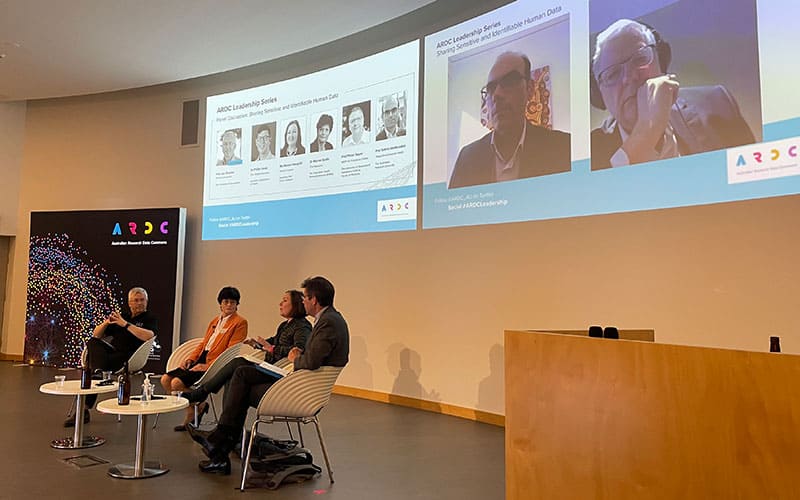
ARCOS Symposium 2024
Go to eventabout ARCOS Symposium 2024
On 3 May 2022, we held the first event of the ARDC Leadership Series on the topic of sharing sensitive and identifiable human data, with over 150 people participating in person and online.
The forum provided decision makers in academia, government and industry with the opportunity to work through some of the data challenges that are impacting Australia’s researchers.
The forum was facilitated by Prof Joe Shapter, Pro-Vice-Chancellor, Research Infrastructure, The University of Queensland, and we were privileged to have the opportunity to host the following panel members:
Rosie Hicks, CEO of ARDC began the meeting by describing the data challenges faced by researchers.
“Access to sensitive and identifiable human data is essential for researchers to gain new insights to understand human health and wellbeing. By analysing and integrating these datasets, researchers can unlock a wealth of knowledge to drive innovation and positive outcomes for the community
“The ARDC is heavily invested in enabling researchers to share sensitive and identifiable human data through a number of initiatives such as our Health Studies Australian National Data Asset (HeSANDA). This has an initial focus on clinical trials, and we have 72 health research organisations across Australia collaborating to build a national infrastructure to enable researchers to access and share data from health studies.
“The initiative aims to stimulate new data driven research ideas, increase the impact of health research and ultimately improve health and wellbeing of Australians. No doubt there are many challenges facing researchers working with sensitive data, but the potential benefits of harnessing this data to generate innovative research solutions is enormous.”

As sensitive data covers a very broad scope, the discussion focussed on approaches to tackling a limited set of challenges:
To focus conversation on a particular set of challenges, Prof Peter Soyer introduced a case study from the Australian Centre of Excellence in Melanoma Imaging & Diagnosis. Prof Soyer is leading a project to create the world’s largest and most comprehensive skin imaging database to help with the early detection of skin cancers, which includes 3 dimensional total body photography. These types of images can simply not be fully de-identified. The project faces significant challenges for sharing data across sectors (government, academia, industry) and across state lines.
Learn more about this case study by viewing the slides from the event.
Each panel member then presented their unique advice, solutions, and suggestions around sharing sensitive data.
The panel discussion covered many of the complexities involved in sharing sensitive health data in an Australian context, including:
Watch the recording of the event:
You can also view the slides presented at the event.
The forum was the first of a series of panel discussions that will be held across 2022.
To hear about the next events in the ARDC Leadership Series, subscribe to our newsletter.
The ARDC is funded through the National Collaborative Research Infrastructure Strategy (NCRIS) to support national digital research infrastructure for Australian researchers.